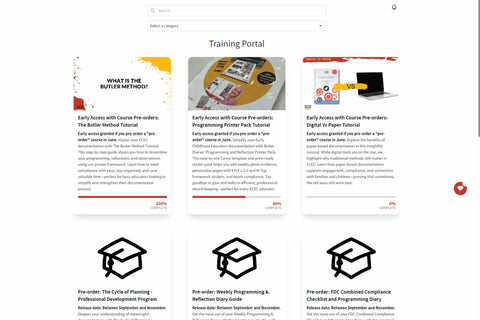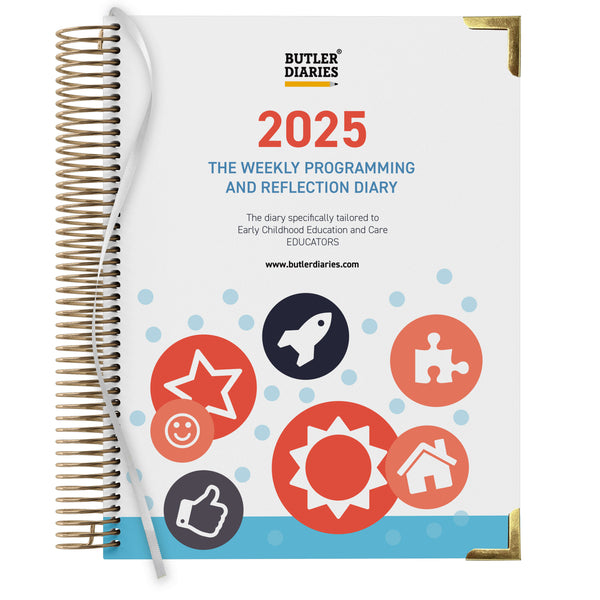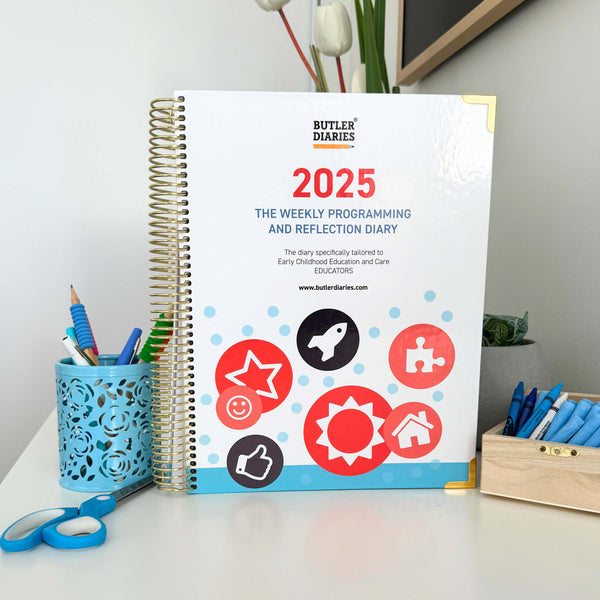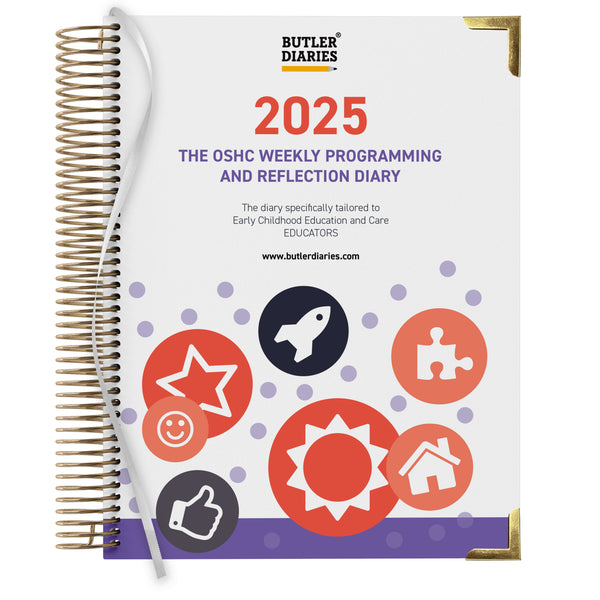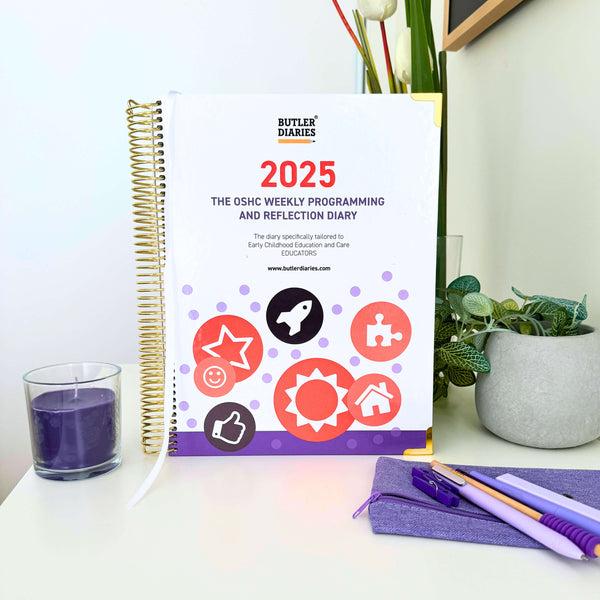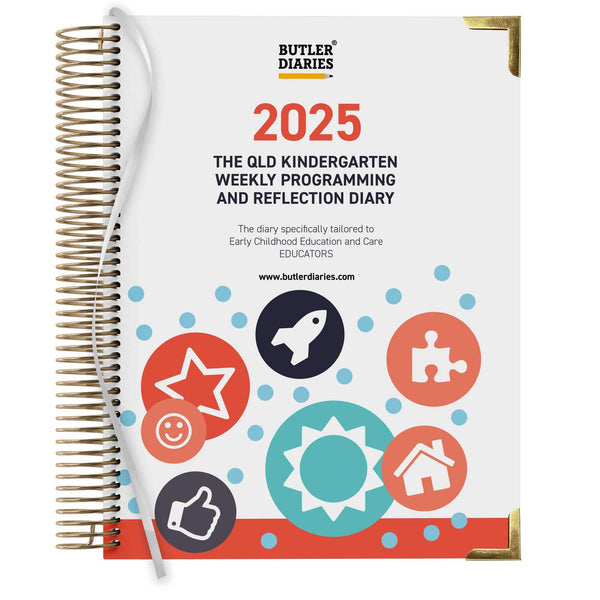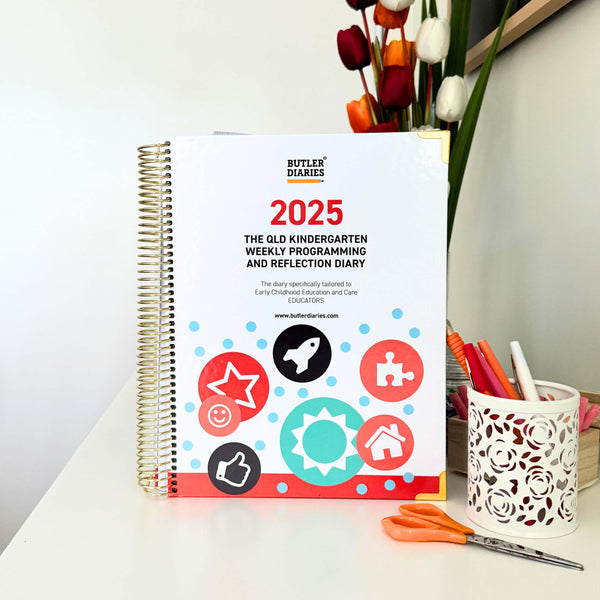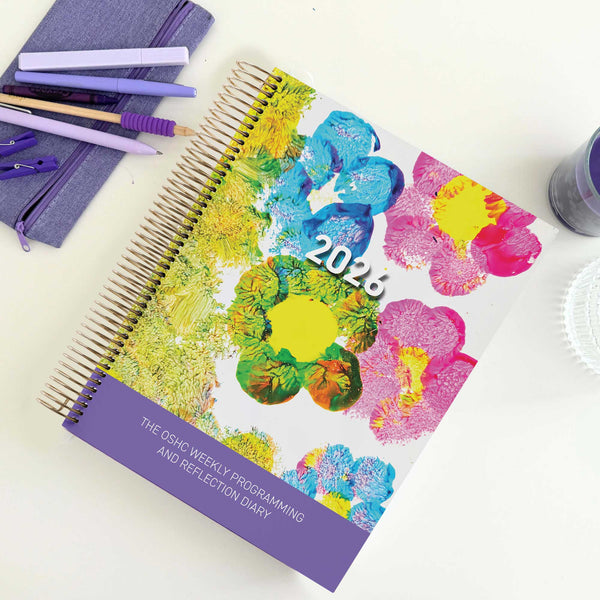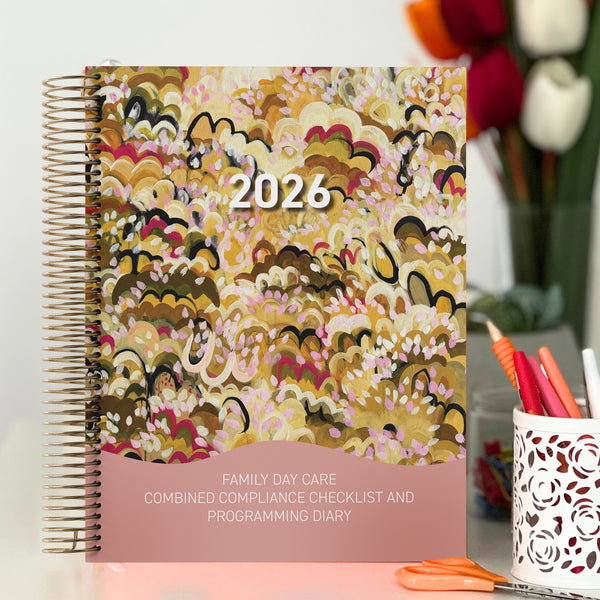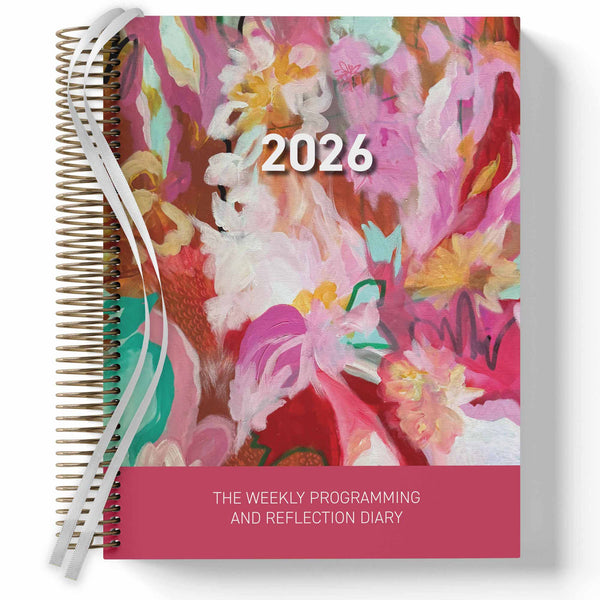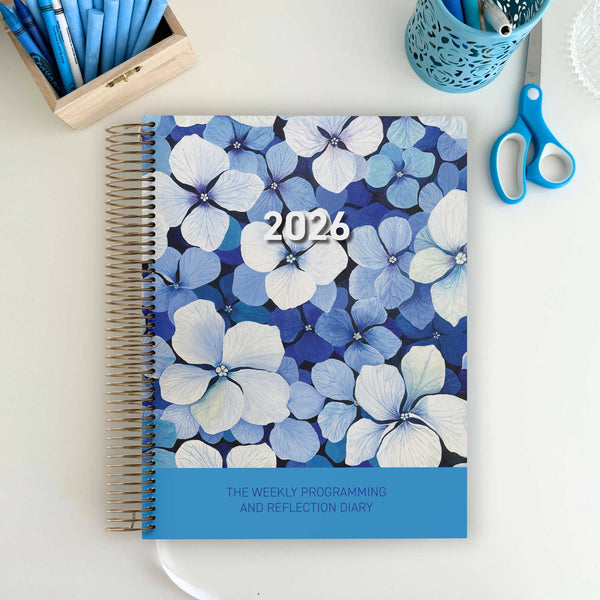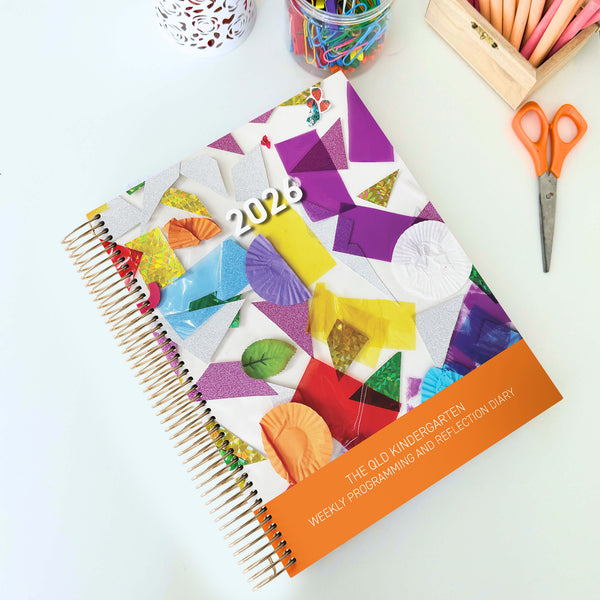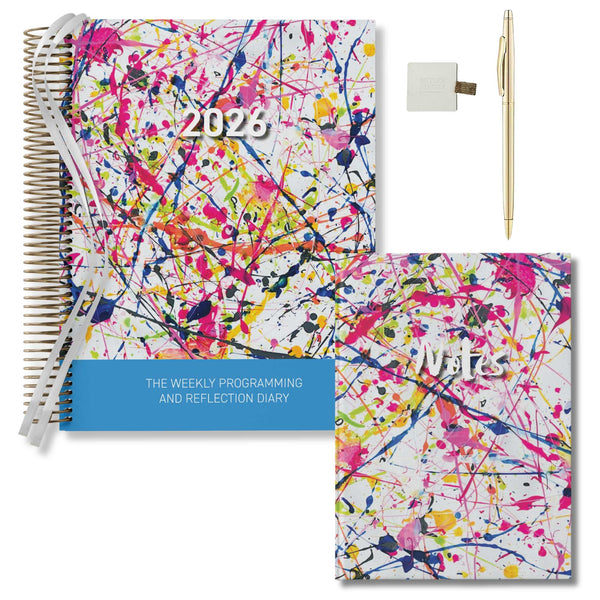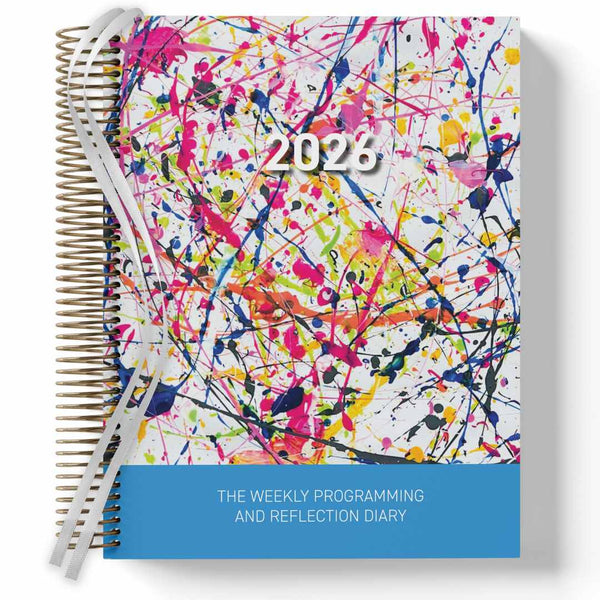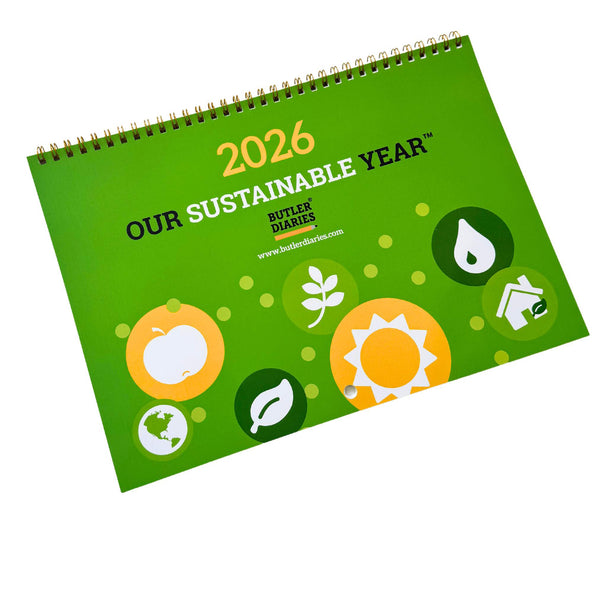Planning tools can save early childhood educators time while ensuring they meet Australian standards like the EYLF and NQS. Here's a quick look at five tools that simplify planning, documentation, and compliance:
- Butler Diaries Programming and Reflection Diaries: Physical diaries aligned with EYLF, MTOP and QKLG, offering planning and compliance support for $69.99.
- Early Years Assessment and Learning Tool (EYALT): A data-driven tool for structured child assessments, tailored for VEYLDF and EYLF.
- Digital Planning Templates and Compliance Checklists: Streamlines lesson planning and regulatory tasks with automated features.
- Butler Diaries Wall Calendars: Visual planners promoting sustainability and inclusivity, priced at $29.99.
- Digital Courses and Professional Development: Affordable $9.99 courses to help educators optimise tools and meet compliance requirements.
These tools reduce administrative burdens, allowing educators to focus on creating meaningful learning experiences for children.
1. Butler Diaries Programming and Reflection Diaries
** **The Butler Diaries Programming and Reflection Diaries are a handy tool for early childhood educators, simplifying the often complex tasks of planning and record-keeping. It's no surprise they hold an impressive 4.95-star rating.
**The Butler Diaries Programming and Reflection Diaries are a handy tool for early childhood educators, simplifying the often complex tasks of planning and record-keeping. It's no surprise they hold an impressive 4.95-star rating.
Alignment with Australian Educational Frameworks
What sets these diaries apart is their alignment with key Australian educational frameworks. They’re designed to work seamlessly with the Early Years Learning Framework (EYLF) and My Time, Our Place (MTOP) framework, helping educators stay on top of regulatory requirements. The structured weekly layout makes it easy to incorporate essential principles from these frameworks into programming and reflections. Recent updates have even added sections addressing sustainability and cultural responsiveness - areas that are becoming increasingly important in Australian early childhood education.
Support for Compliance and Documentation
Beyond planning, these diaries shine in helping educators meet compliance and documentation standards. Craig Fenoglio, who works in the Family Daycare sector, shared how essential the diary has been:
"Coming from the Family Daycare sector of the industry, this diary has been an integral part of our compliance, planning, communications and programming!"
The diaries are packed with practical features like ribbons, bookmarks, and internal pockets, making it easy to access information on the go. Tosca, who supported Family Daycare educators with planning and programming, noted how the diaries improved consistency:
"As my role last year I provided program and planning support to FDC educators who were struggling to meet their requirements in this area. Your diary was a very useful tool to demonstrate that it is not that difficult to plan and reflect on their practice. All the relevant information can be recorded concisely and very quickly. They found they could establish a regular planning cycle. This was a big plus for them."
The diaries also improve communication among educators, parents, and colleagues by creating a centralised record of curriculum planning and reflections. Karlee, a Nominated Supervisor, highlighted their value:
"We love your books Thank you so much for creating such an amazing document. We use this as our weekly program curriculum planner along with our reflections"
Priced at $69.99, these durable, hardcover, spiral-bound diaries are a solid investment for educators looking to ease the stress of compliance and planning while staying organised.
2. Early Years Assessment and Learning Tool (EYALT)
The Early Years Assessment and Learning Tool (EYALT) provides a structured and consistent way to document children's learning. Developed with the input of over 300 educators and based on more than 5,000 child observations from 150+ services, this tool reflects extensive practical experience.
Alignment with Australian Frameworks
One of EYALT's key strengths is how well it aligns with Australia's major educational frameworks. It connects directly with the five learning and development outcomes outlined in the Early Years Learning Framework for Australia (EYLF) and My Time, Our Place: Framework for School Age Care in Australia (MTOP). This alignment ensures educators can use the tool across various settings without worrying about conflicting requirements.
For educators in Victoria, the EYALT goes a step further. It aligns closely with the Victorian Early Years Learning and Development Framework (VEYLDF) and the Victorian Curriculum, offering eight modules that reflect these frameworks. Designed to support best practices, it incorporates the VEYLDF Practice Principle: Assessment for Learning and Development. Additionally, its self-assessment rubric integrates elements and standards from the National Quality Framework (NQF). This thoughtful integration simplifies assessment practices and ensures they are consistent across different environments, making it easier for educators to incorporate the tool into their daily activities.
Support for Compliance and Documentation
The EYALT is more than just a framework - it simplifies the assessment process for educators. It provides a clear and systematic approach to observing and assessing children's learning, moving away from random observations to purposeful teaching that aligns with the EYLF. This structured method helps educators gain meaningful insights into children's abilities, directly informing their teaching strategies.
As part of a $22 million government initiative to enhance quality practices in early childhood education, the EYALT reflects a broader commitment to raising standards. Its design not only helps meet regulatory requirements but also gives educators valuable tools to track and support each child's development.
Practicality and Ease of Use
The EYALT is designed with educators' day-to-day realities in mind. Rather than adding complexity, it integrates seamlessly into regular workflows, providing a straightforward way to document ongoing learning. By moving from casual observations to intentional and systematic assessments, the tool allows educators to focus on creating a clear understanding of each child's progress.
This approach goes beyond simply meeting compliance. The EYALT helps educators develop actionable insights that shape future planning and teaching. Its practical design makes it an indispensable resource for those seeking to balance regulatory demands with meaningful educational outcomes.
3. Digital Planning Templates and Compliance Checklists
** **Digital templates and checklists have become indispensable tools for early childhood educators, helping them balance quality teaching with compliance requirements. These tools provide structured frameworks that simplify lesson planning and regulatory adherence, blending traditional approaches with the conveniences of modern technology.
**Digital templates and checklists have become indispensable tools for early childhood educators, helping them balance quality teaching with compliance requirements. These tools provide structured frameworks that simplify lesson planning and regulatory adherence, blending traditional approaches with the conveniences of modern technology.
Alignment with Australian Frameworks
Digital planning templates are specifically crafted to align with Australia's key educational frameworks, making it easier for educators to develop plans that meet curriculum standards. These templates support the Early Years Learning Framework (EYLF) by incorporating all learning and development outcomes and principles and practices into structured plans. By pairing digital templates with paper-based methods, educators can embrace technology while maintaining compliance with established frameworks.
Support for Compliance and Documentation
Regulatory requirements can be complex, but digital checklists make them more manageable. For instance, in November 2024, Haven Education introduced a comprehensive compliance checklist tailored for Long Day Care services in Queensland, ACT, and New South Wales. Developed by a former Authorised Officer, this checklist ensures that every aspect of service operations and documentation is accounted for.
These templates also support the EYLF planning cycle - observing, analysing, planning, acting, and reflecting - ensuring that educators remain responsive to children's needs while meeting regulatory standards. By offering a systematic way to document processes, these tools create clear audit trails, simplifying regulatory reviews.
"Effective planning ensures each activity aligns with curriculum outcomes and child development goals."
Practicality and Ease of Integration into Daily Workflows
Designed with practicality in mind, digital planning templates integrate seamlessly into educators' daily workflows without adding unnecessary complexity. Their pre-structured formats save time by covering all essential details, allowing educators to focus on teaching rather than administrative tasks.
"Planning in early childhood education helps educators prepare for the unexpected while providing structure and consistency that young children thrive on."
The digital format also allows for quick updates and easy modifications, enabling educators to adapt plans based on observations or changing circumstances. This adaptability is especially important in early childhood settings, where being responsive to children's evolving interests and needs is key to effective teaching.
sbb-itb-706bda8
4. Butler Diaries Wall Calendars and Organisation Resources
 While digital tools are great for planning, there’s something special about having a physical resource that’s always visible and within reach. Butler Diaries has reimagined traditional wall calendars, turning them into practical planning tools tailored for early childhood educators. These aren’t just about keeping track of dates - they’re designed to help educators integrate meaningful educational principles into everyday activities.
While digital tools are great for planning, there’s something special about having a physical resource that’s always visible and within reach. Butler Diaries has reimagined traditional wall calendars, turning them into practical planning tools tailored for early childhood educators. These aren’t just about keeping track of dates - they’re designed to help educators integrate meaningful educational principles into everyday activities.
Alignment with Australian Frameworks
Butler Diaries offers two specialised wall calendars for early childhood education professionals: the Sustainable Year Calendar and the Culturally Responsive Year Calendar. Both are priced at $29.99 and align with Australia’s key early childhood education frameworks.
"These special interest calendars are not just planning tools but are also powerful resources that align with the Early Years Learning Framework (EYLF) and My Time, Our Place (MTOP) frameworks."
The Sustainable Year Calendar focuses on promoting environmental awareness, aligning with EYLF and National Quality Standard (NQS) Quality Area 3. It’s a handy tool for educators to incorporate sustainability themes into daily activities, helping children build an early understanding of sustainability across all three dimensions.
On the other hand, the Culturally Responsive Year Calendar encourages inclusivity and celebrates diversity, aligning with NQS Quality Area 6. It offers practical ideas for educators to honour various cultures throughout the year, helping meet educational standards while fostering a sense of belonging and respect among children.
Support for Compliance and Documentation
These calendars aren’t just about planning - they’re also great for supporting compliance and improving documentation. They help educators create detailed Quality Improvement Plans (QIPs) by providing a structured way to meet specific National Quality Standards.
The Culturally Responsive Year Calendar includes prompts that make it easier to reflect on and document cultural responsiveness. These prompts guide educators in recording their efforts to embrace inclusivity, creating evidence of their commitment to fostering a culturally aware environment.
Both calendars help educators track how they integrate sustainability and cultural awareness into their programs, ensuring consistent, high-quality documentation.
Practicality and Ease of Use
The wall calendar format is a big plus for busy educators. Because they’re always visible, these calendars serve as quick, accessible reminders that can guide daily activities without disrupting the flow of the day.
Unlike digital templates that might require extra training or setup, these calendars are ready to use and fit seamlessly into existing routines. Educators can refer to them during team meetings, individual planning, or even in the moment when a teachable opportunity arises. Whether it’s a sustainability theme or a cultural celebration, these calendars are there to provide instant inspiration.
Their constant presence ensures key dates, themes, and ideas are always at hand, making them an invaluable tool for early childhood educators juggling multiple responsibilities.
5. Digital Courses and Professional Development
** **Staying up to date with best practices and regulatory requirements is a constant challenge for early childhood educators, especially when time is tight. Digital courses offer a practical solution, easing administrative workloads while supporting high-quality teaching. Butler Diaries addresses this need with digital courses priced at $9.99 each, tailored to help educators optimise their planning tools and meet compliance standards.
**Staying up to date with best practices and regulatory requirements is a constant challenge for early childhood educators, especially when time is tight. Digital courses offer a practical solution, easing administrative workloads while supporting high-quality teaching. Butler Diaries addresses this need with digital courses priced at $9.99 each, tailored to help educators optimise their planning tools and meet compliance standards.
These courses provide clear, step-by-step instructions on using planning tools, share compliance tips, and suggest practical strategies that fit seamlessly into educators' daily routines. Importantly, they align with Australia's established early childhood frameworks, ensuring relevance and ease of application.
Alignment with Australian Frameworks
The digital professional development resources are specifically designed to help educators apply Australia's key early childhood frameworks. They align with the Early Years Learning Framework (EYLF), the Victorian Early Years Learning and Development Framework (VEYLDF), and the National Quality Framework (NQF).
"The Early Years Learning Framework (EYLF) recognises that early childhood is a critical time in children's learning and development. The EYLF provides a set of principles, practices and outcomes as a guide for educators." – Department for Education, Children and Young People
These resources include a mix of modules, videos, guides, and tools that reinforce the principles and outcomes outlined in these frameworks. By integrating these resources into their practice, educators can ensure they are meeting the standards and expectations of these frameworks.
Support for Compliance and Documentation
One of the biggest time drains for Australian early childhood educators is compliance and documentation, which can consume up to 35% of their working hours. Digital courses help tackle this issue by promoting consistency, simplifying report generation, and automating routine tasks. Features like system reminders and notifications ensure that legal compliance for documentation and qualifications is maintained. This reduction in administrative burden allows educators to focus more on teaching and less on paperwork, improving the overall flow of daily operations.
Practicality and Ease of Integration into Daily Workflows
Digital learning also offers the flexibility educators need to balance professional development with their classroom responsibilities. Some reports suggest that AI tools integrated into these systems can cut documentation time by as much as 80%, all while maintaining professional standards.
Choosing digital courses that come with thorough onboarding and ongoing support ensures smoother implementation and better outcomes for children. Additionally, as educators improve their digital literacy, they can model critical thinking and problem-solving skills for the children in their care, fostering a richer learning environment.
Tool Comparison Table
Choosing the right planning tools can make a big difference for educators working within Australian frameworks. Below is a comparison of five key tools, highlighting their framework alignment, compliance support, and advantages for early childhood education professionals.
| Tool | Framework Alignment | Compliance Support | Advantages | Best For |
|---|---|---|---|---|
| Butler Diaries Programming and Reflection Diaries | EYLF, MTOP, QKLG, VEYLDF, NQS Quality Areas 1-7 | Built-in compliance tracking, documentation templates | Comprehensive planning cycles, reflection prompts, and customisable sections | Educators seeking a combined resource for planning and reflection |
| Early Years Assessment and Learning Tool (EYALT) | VEYLDF, Victorian Curriculum (8 modules) | Assessment documentation, progress tracking | Evidence-based observations, over 5,000 child data points, co-designed with 300+ educators | Victorian educators focusing on assessment and learning outcomes |
| Digital Planning Templates and Compliance Checklists | EYLF, MTOP, NQS, focus areas such as Planning Cycle | Simplified practice, consistent documentation | Time-saving templates, standardised formats, and easy digital access | Services using hybrid and mixed documentation systems |
| Butler Diaries Wall Calendars and Organisation Resources | EYLF & MTOP learning outcomes, cultural responsiveness | Highlights special interests, focus areas | Visual organisation, sustainable materials, and culturally inclusive designs | Teams looking for visual tools for organisation and cultural inclusivity |
| Digital Courses and Professional Development | EYLF, MTOP, QKLG, VEYLDF, NQF alignment | Step-by-step compliance guidance, framework application | Affordable courses ($9.99 each), flexible learning, practical strategies | Educators looking for targeted professional growth and tool optimisation |
A mix of both digital and physical tools can help streamline planning processes and improve outcomes in early childhood settings.
"Educators draw on a range of sources of information including their professional knowledge and early childhood theories to clearly identify children's strengths and capacities and consider these in relation to the Learning Outcomes and/or other assessment criteria." – EYLF V2.0
The EYALT stands out for its strong research foundation. Developed with input from over 300 educators and based on data from 5,000+ child observations across 150+ services, it offers a reliable and evidence-backed approach to tracking learning outcomes and ensuring assessment accuracy.
Framework Integration Considerations
When selecting tools, it’s important to evaluate how well they align with the EYLF's five planning stages: observe, assess, plan, implement, and evaluate. Tools that address all these stages provide complete support for educators. For instance, Butler Diaries Programming and Reflection Diaries include structured sections that cover every stage, while the EYALT focuses on enhancing observation and assessment processes.
Using tools that align with established frameworks is key to maintaining quality and consistency in early childhood education.
Conclusion
The discussion above highlights the critical role planning tools play in delivering quality early childhood education in Australia. Tools like Butler Diaries Programming and Reflection Diaries, as well as EYALT, simplify key tasks such as programming, reflection, and assessment, making them essential resources for educators.
Digital planning templates and compliance checklists are particularly useful for automating compliance tracking. This reduces the administrative workload and helps early childhood services meet the requirements of the National Law and Regulations, the Children's Services Act, the Children's Services Regulations, and the Child Safe Standards.
For centres looking to highlight key practices and show your QIP in action, resources like Butler Diaries Wall Calendars provide visual organisation support, while digital courses and professional development tools offer cost-effective ways to enhance skills and make the most of available planning tools.
When choosing planning tools, it's important to consider your centre's specific challenges, budget, and long-term goals. For example, Victorian educators often favour EYALT due to its alignment with the VEYLDF, while centres moving towards digital systems may prioritise templates and compliance checklists to streamline systems and save time. Butler Diaries' integrated approach, which combines programming and reflection tools, is another popular choice for teams seeking comprehensive support.
A good starting point might be to adopt one or two tools that address your immediate needs, then gradually expand your toolkit as you become more familiar with the systems. Combining physical and digital resources often creates a balanced approach that meets both individual educator needs and broader compliance requirements. By integrating these tools step by step, centres can develop a flexible system capable of adapting to new challenges.
Both the Australian Children's Education and Care Quality Authority (ACECQA) and state regulatory bodies emphasise the importance of thorough planning and documentation. Reducing administrative burdens through targeted tools not only supports compliance but also enhances educational outcomes. Thoughtful investment in the right resources helps ensure long-term success and the delivery of quality education to all children.
FAQs
How do Butler Diaries' Programming and Reflection Diaries support Australian educators in meeting EYLF and MTOP requirements?
Butler Diaries' Programming and Reflection Diaries are crafted to work perfectly with the Early Years Learning Framework (EYLF) and My Time, Our Place (MTOP) guidelines. These diaries offer structured templates that simplify planning and reflection, helping educators document learning outcomes, design engaging activities, and thoughtfully evaluate their teaching practices.
By simplifying weekly programming and promoting ongoing improvement, these tools support compliance with the National Quality Standard (NQS), while also saving educators time and easing the burden of administrative tasks.
Why is the Early Years Assessment and Learning Tool (EYALT) an essential resource for early childhood educators in Victoria?
The Early Years Assessment and Learning Tool (EYALT) serves as an essential resource for educators across Victoria, providing a structured and consistent way to understand children's learning and development. Instead of relying on formal testing, it emphasises regular observations, allowing educators to adapt their teaching strategies to suit each child's individual needs.
This approach plays a key role in delivering quality kindergarten programs, supporting play-based learning, and ensuring a smooth progression in children's education. Designed to align with Victoria's educational standards, the tool equips educators to craft meaningful, child-focused learning experiences.
How can digital planning templates and compliance checklists help early childhood educators save time and stay organised?
Digital planning templates and compliance checklists take the hassle out of admin work for early childhood educators by simplifying planning, documentation, and compliance tracking. By automating repetitive tasks and minimising errors, these tools free up time for educators to focus on what truly matters - interacting with children and delivering enriching educational experiences.
These digital tools help educators stay organised by streamlining daily activity schedules, keeping track of regulatory requirements, and efficiently recording observations. Plus, they make it easy to update and share records, with secure storage for future reference. The result? Less stress, a lighter workload, and more time to enjoy a healthier work-life balance.

